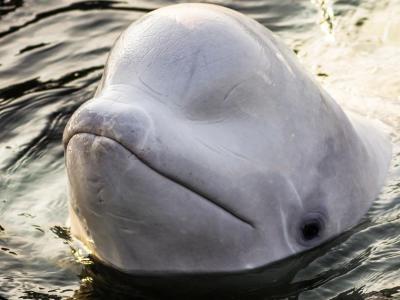Benny the Beluga is all alone in the Thames. Potentially having been in the river since as far back as July, the beluga whale affectionately named Benny (despite a lack of information on the actual sex) has been causing a stir in the last month since he was officially sighted. The 3.5m beluga is currently just a sub-adult with the potential to grow to around 6m long, which makes it a relatively small toothed whale (similar to dolphins). The species is instantly recognisable for its stark white colouration but, to the untrained eye, could have easily been mistaken for a dolphin or seal, which are relatively common on the Thames. A characteristic feature of belugas is the bulbous lump on their forehead (comically called a ‘melon’) which is flexible, allowing them to make different facial expressions.
Belugas have been sighted off the UK coast in the past, but Benny is the most southerly recorded sighting and so little is known about how long he will stay and whether he will survive his detour. Belugas usually live in the Arctic and many migrate south during the autumn, but for Benny to have become so lost is concerning. Normally highly sociable animals, living in pods of up to hundreds of individuals, it is strange that Benny is here by himself. Ocean noise – noise pollution caused by shipping, industrial oil extraction and other human activities in the marine environment – often plays a role in disorientating whales when they try to communicate to others or navigate. It is theorised that ocean noise could have played a part in separating Benny from his pod and his subsequent stray into the Thames.
Normally highly sociable animals, living in pods of up to hundreds of individuals, it is strange that Benny is here by himself.
Despite this, he appears to have found a food source in the Thames and is avoiding collisions with shipping traffic due to the vigilant efforts of volunteer divers. However, there are concerns that if he waits until next spring to travel back to the Arctic as the ice fragments, one of the many hazards in the Thames will get the better of him.
The positive outcome of his appearance is an increased interest in the species and a potential to use him as a charismatic ambassador for belugas and other whales which are being disturbed by human activities in marine environments. Much like the polar bear and other arctic species, belugas depend on the sea ice remaining thick and solid for protection from predators and as a place to feed. Human induced climate change is already reducing Arctic sea ice cover. Coupled with oil spills from drilling in the Arctic, it’s clear we have really left the belugas with little habitat in which they can thrive.
Whether or not the whale stays for much longer, hopefully Benny will have done his part in spreading the message about the plight of his fellow belugas.
By Anna Davison
image source: countrylife.co.uk

